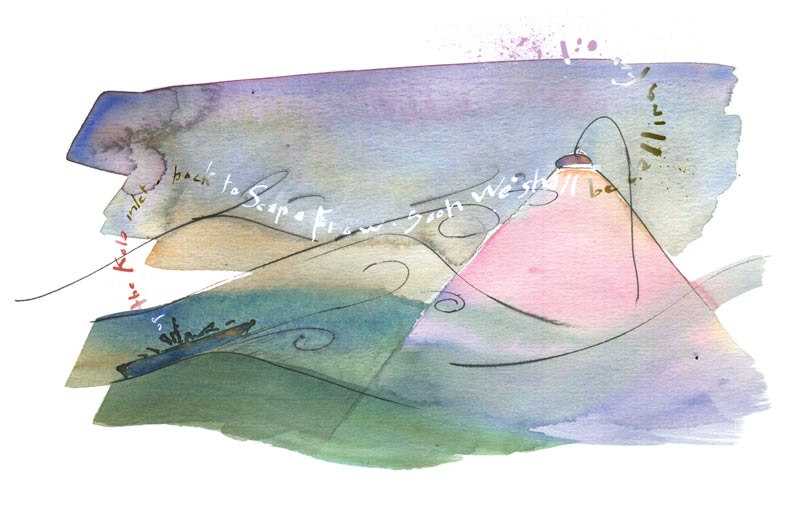
Over the years, soldiers have found that music helps pass the time and keeps spirits up on long marches. Some military songs long outlived the conflicts that inspired them. During the American Civil War, General William Sherman’s men stepped out to the strains of “Marching Through Georgia.” A generation later, British soldiers in South Africa sang “We are Marching to Pretoria.” The First World War had “Mademoiselle from Armentieres,” “Pack up Your Troubles in Your Old Kit Bag” and “It’s a Long Way to Tipperary.” In the Second World War, Canadian soldiers, sailors and air force types produced their own songs. They never hit the top of the charts, but they spoke to Canadian experiences.
Perhaps the worst Second World War assignment for a Canadian warship was the Murmansk Run to the port in the northern Soviet Union. The convoys sailed in winter, using the Arctic darkness and terrible weather as a shield against German forces based in Norway. HMC ships Sioux and Algonquin were part of the 23rd Flotilla that plied those waters. Their crews recounted the experience in a song set to the tune of “Lili Marlene.” The original was loved by both German and Allied troops and its catchy melody was used with the following words for the Canadian version:
Up to Kola inlet, back to Scapa Flow,
Soon we shall be calling for oil at Petsamo,
Why does it always seem to be?
Flotilla number twenty-three,
Up in the Arctic Ocean,
Up in the Barents Sea.
Battleships and cruisers, lying ’round
in state,
Watching poor destroyers passing
Switha Gate,
Those ships the papers call the fleet,
They look so sweet, but have no beat,
Up in the Arctic Ocean
Up in the Barents Sea.
The port of Murmansk was on Kola Inlet and Petsamo is a nearby port. Scapa Flow was a major British naval base in northern Scotland and Switha Gate was an entrance to the anchorage. The army, meanwhile, had its own ditties.
In December 1944, some officers of The Loyal Edmonton Regiment composed “O’er the Hills of Sicily,” recounting their campaign through Italy, clearly with special memories of the corned beef “bully” that was a staple of their rations. They set it to “Waltzing Matilda”:
O’er the hills of Sicily, up the toe of Italy,
Came the Loyal Edmontons from over
the sea,
And they sang as they stuffed the bully
in their haversacks,
Who’ll come a marching to Berlin with me?
Marching to Berlin, Marching to Berlin,
Who’ll come a-marching to Berlin with me?
And they sang as they stuffed the bully
in their haversacks,
Who’ll come a-marching to Berlin with me?
The Royal Canadian Air Force was not to be left out. There was 417 “City of Windsor” Squadron, the only Canadian squadron with what was known as the Desert Air Force, or DAF. Starting in Egypt in 1942, the Canadians helped support the British Eighth Army across North Africa and through the Sicilian and Italian campaigns. The Canadians apparently took pride in ignoring spit and polish and enjoyed the role of riff-raff as is clear in their theme song. It was also set to the tune of “Lili Marlene”:
We are a few Canadians, here in Italy,
Working with the RAF boys to win
the victory,
Going around with a vacant stare,
We have no clues, but do we care?
We’re the riff-raff of the Air Force,
And we’re going home, you see.
The poor old Royal Air Force are getting slightly cheesed,
Because we look so scruffy and never
try to please,
Buttons never polished, minus caps,
We don’t say “Sir” to those dear chaps,
We’re the riff-raff of the Air Force,
And we’re part of DAF.
The poor old Royal Air Force are getting slightly cheesed,
Because we look so scruffy and never try to please.
No collection of Canadian wartime songs can leave out “The D-Day Dodgers,” which was an angry retort to Lady Astor, a British member of Parliament. After a tour of the Italian front, she is reported to have described the Eighth Army as a collection of drunken, ill-disciplined louts and “D-Day Dodgers” who were avoiding the real fighting in northwest Europe. The army and the Canadians who were part of it, replied again using the tune of “Lili Marlene”:
We are the D-Day dodgers, out in Italy,
Always on the vino, always on a spree,
Eighth Army skivers and their tanks,
We go to war in ties and slacks,
We are the D-Day Dodgers, in sunny Italy.
We landed at Salerno, a holiday with pay,
Jerry brought his bands out to cheer us
on our way,
Showed us the sights and gave us tea,
We all sang songs, the beer was free,
We are the D-Day Dodgers, in sunny Italy.
Palermo and Cassino were taken
in our stride,
We did not go to fight there, we just went for the ride,
Anzio and Sangro are just names,
We only went to look for dames,
We are the D-Day Dodgers,
in sunny Italy.
Advertisement












